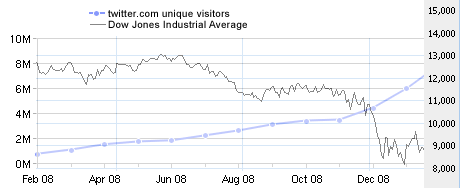Economic News
Harvard Economist Blames Twitter for Down Economy
A new study suggests that Twitter is the root cause of the current economic malaise. Policy experts predict a Twitter moratorium may be declared for Summer 2009 as part of an effort to stimulate economic production and reverse GDP declines.
Professor Martin Schmeldon of Harvard Business School recently released research findings that suggest excessive Twitter use may have caused the current economic downturn.
"We see the rapid rise of Twitter usage in 2008 correlating very strongly with a tremendous decrease in American productivity," said Schmeldon. "Our regression analysis on the data suggests a causal relationship that may actually be larger than the impact of the much-touted subprime collateral debt refinancing triggers."

Twitter is a free social messaging utility for staying connected in real-time. Whenever the urge strikes you, you can tweet an answer to the simple question: What are you doing?
Employees who might otherwise be working productively and contributing to the economy can instead create Tweets, such as "I just realized I clipped all of my nails today except for one" or "My co-worker is drinking pepsi. Pepsi!!! I want some. Stupid Lent" or "Financial systems require high levels of trust and oversight. Take away the oversight and encourage high levels of risk for personal gain."
Large companies are shifting marketing budgets over to social media marketing initiatives that promise to quadruple revenues. For example, Comcast is an active Twitter user and tweets things like "@xyz, relooking at the picture it looks to me to be the box. The reason I say that is the bar is messed up too. I would hard reboot."
"The problem is that many of the marketers at these large companies really want to have some Twitter experience on their resume, so they are subverting dollars that might actually go to positive NPV projects," comments Schmeldon. "Twitter may be the largest contributor to public company value destruction that I've seen since we moved away from mark-to-market accounting rules back in 1982."
Beltway insider and renowned economic advisor, West Tirrettia, believes Schmeldon's study could have some implications for economic policy that comes out of the current legislative session. "Congress has duly taken note of this research," said Tirrettia. "We may see some Twitter moratoriums coming in future stimulus bills. It's really just a question of whether lawmakers are willing to put their necks out against something that has become very popular back home in their constituencies."
The statistical validity of Schmeldon's research has been questioned by many statisticians and economists, including Pat Sooshisif, an associate professor of public policy at the Yale School of Management. "I think an informed reader of this research paper should be able to determine that Schmeldon wasn't engaging in serious statistical analysis of this data," wrote Sooshisif in the March 2009 issue of The Journal of Economic Perspective and Analysis. "Schmeldon cites a dual inflection point in December 2008. The stochastic confidence interval for that assertion is very low, and it is our conclusion that the z-factor is not statistically significant." Professor Schmeldon did not return repeated calls seeking comment on this research.
Share this article
Additional Resources for Entrepreneurs



Conversation Board
What's your take on this economic research? We welcome all comments.